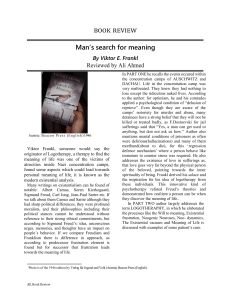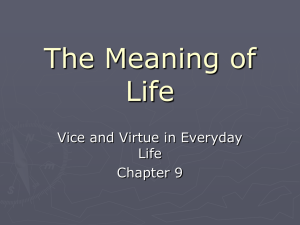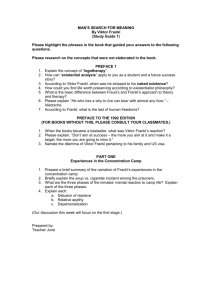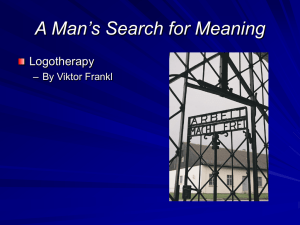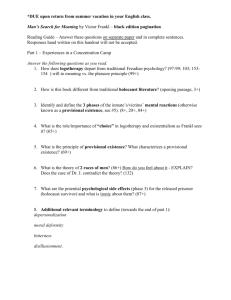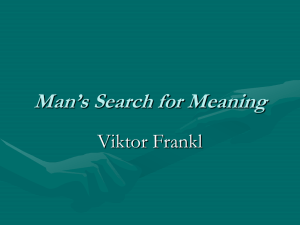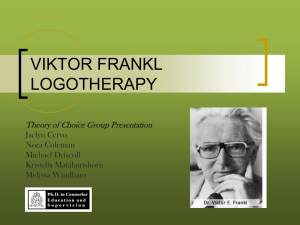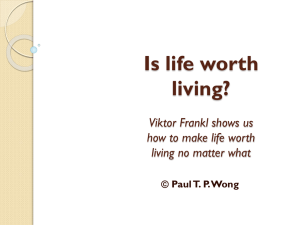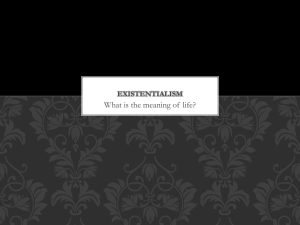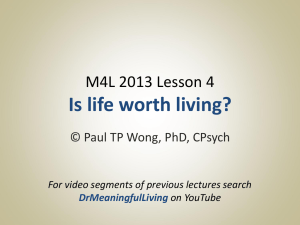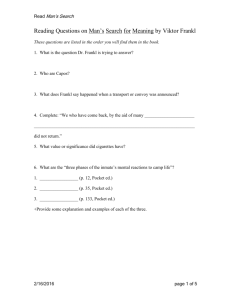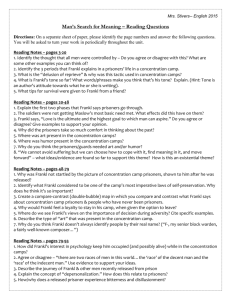Introduction to Frankl
advertisement
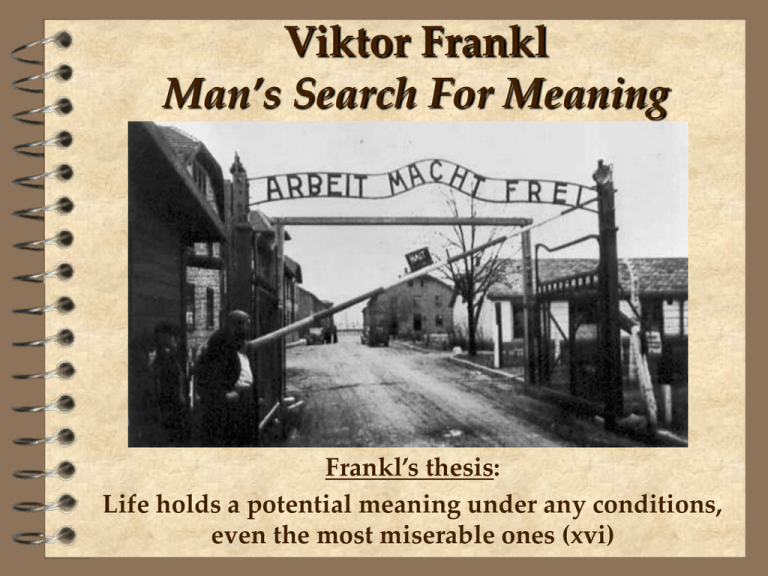
Viktor Frankl Man’s Search For Meaning Frankl’s thesis: Life holds a potential meaning under any conditions, even the most miserable ones (xvi) Viktor Frankl (1905-1997) Prisoner in the Nazi concentration camps at Auschwitz and Dachau (1942-1945) Parents, brother, wife, and children died in the camps Logotherapy – existential approach to psychological practice Rejects the deterministic view of human nature (not fatalistic) Preface Methodology: “existential validation” - examine the most extreme case of apparent meaninglessness and show meaning is possible even there “Validation” – Not “proof” – Strong reasons to find reasonable and true; not contradicted by anything known; “valid” “Existential” – We spent some time examining the “existential worldview” – In general it is “based on a person’s lived experience” the “actual” The Human Condition There are six dimensions of the human condition according to the existential approach: 1. The capacity for self-awareness 2. Freedom and responsibility 3. Striving for identity and relationship to others 4. The search for meaning 5. Anxiety as a condition of living 6. Awareness of death and nonbeing The first stage the process of discovering the true nature of the circumstances of camp life – Shock – Humor – Curiosity there are two possible responses: – acceptance – suicide The second stage maintaining oneself in these circumstances relative apathy survival at all costs remnants of humanity discovery of the key to survival The final stage release and liberation coming back to normalcy transition is a process that cannot be rushed the experience of liberation seems difficult to describe, but results ultimately in an experience of personal affirmation, i.e., life is meaningful after all. The key to survival (Frankl’s existentialism) The last of human freedoms: to choose your attitude in the face of life’s circumstances Nature of Frankl’s universe: a here-and-now world of human existence, with every moment of each person’s life is pregnant with unique potential for meaning Our role: we are free to find meaning in our lives Frankl’s Existentialism (cont’d) The flaw: while we can readily find meaning in creativity and relationship, suffering and death seem to lead us to conclude we are in fact unfree and our lives at root meaningless to yield the last of human freedoms The remedy: accept unavoidable suffering as a necessary part of human existence, thereby discovering the existential meaning in life Frankl’s Existentialist Perspective The "really" real is what I experience In any experience I have the freedom to choose how I will act (not determined) Man is driven by a need to find meaning – not pleasure/pain avoidance (Freud) – or mastery (Adler/Nietzsche) Many problems we face are "meaning" problems — we fail to see/lack the courage to find hope; but our freedom to choose means we have a responsibility to choose What is Existentialism??? A slippery concept…an approach to a way of looking at the world as opposed to a systematic philosophy More a genus of worldviews than a single species Existentialists can be religious (Frankl, Buber) or atheist (Camus, Sartre) Common Themes of Existentialism 1. the personal struggle with existence is the core of what is essentially real 2. this reality can never be abstract and can only be found in the concrete circumstances of a person’s life 3. we are free to choose our response to life’s circumstances Two Existential Approaches A better classification of existentialist approaches is whether they see transcendence in reality or simply absurdity Transcendence – reality is more than what we experience with our senses – e.g. Martin Buber, Viktor Frankl, Søren Kierkegaard Absurd (ab surd = from meaninglessness) – without meaning, or possibility of meaning; something completely out of any context – e.g. Albert Camus, Jean-Paul Sartre – (Friedrich Nietzsche and Fyodor Dostoevsky are somewhere in the middle) Existentialism and Absurdity All existentialism confronts the absurdity of human existence: – Sartre: "Man is condemned to be free" — so deal! – Camus: Sisyphus triumphs by embracing his fate. Frankl vs. Absurdity Frankl is much more hopeful than others. We struggle with meaning not because life has none, but because it’s “too big” to be fully realized in any given moment (the only way we can experience reality). Contrast Sartre who writes, “Man is condemned to be free.” But for Frankl this same freedom holds the possibility of transcending the apparent meaninglessness of suffering and death Frank suggests the reason we fail to see the transcendental meaning is not because it isn’t there Rather, it’s too big to fit into human experience
